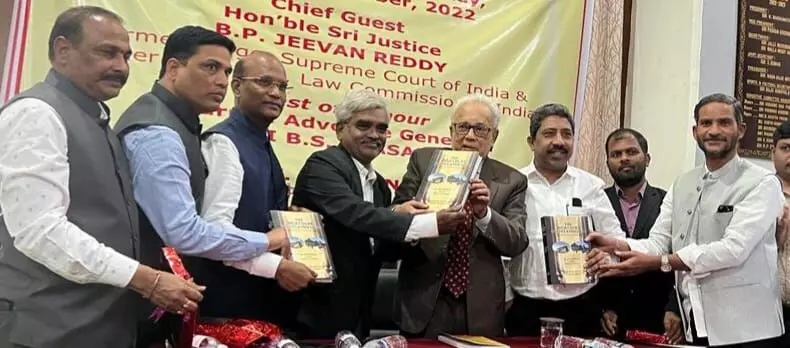Article 14 basic feature of Constitution: Former SC judge Justice Jeevan Reddy
On Saturday, Justice B.P Jeevan Reddy released a book titled “The High Court Practice & Procedure” penned by Supreme Court advocate Dr. A.M Krishna in the premises of Telangana High Court Bar Association, Hyderabad.
By Newsmeter Network
Hyderabad: On the eve of the Constitution Day celebrations, Telangana High Court Advocates Association (THCAA), on Saturday, organised a programme in the High Court Bar Association Hall. It was attended by former Supreme Court judge and former chairman of the Law Commission of India Justice B.P Jeevan Reddy, who was the chief guest.
Speaking on the occasion, Justice Jeevan Reddy suggested that lawyers read the Constitution Assembly debates whenever they find time as they give knowledge and awareness about the law.
Further, Justice Jeevan Reddy emphasised the constitutional conventions and the status of binding precedents. He asserted that the Constitution must be operated in good faith, and asked if it is happening nowadays.
The Prime Minister must inform the decisions of the administration or governance to the President, but the present day system has changed, lamented Justice Jeevan Reddy.
"I will give an example of what is happening in several states of India nowadays. According to the 10th Schedule of the Constitution, the question of disqualification of members of the Legislative Assembly is to be decided by the Speaker. Probably the idea was that since it is a matter within the House, no outside agency, including the courts, should interfere. The legislature must decide that question. So, the power has been given to the Speaker," opined Justice Reddy.
He continued, "What is happening now in several states—not only now, for decades—is that soon after the election, the Opposition parties walk to the ruling party (to switch parties). Then applications are filed before the Speaker to disqualify them because they have violated the 10th Schedule, clause 2."
He added, "The Speaker doesn't decide. We are seeing that the Speaker sits on the matter until the term of the legislature is over. These people continue to be in power and become ministers."
Justice Jeevan Reddy said, "This is not only the violation of conditions and understanding. The Constitution has given the Speaker the right to take a speedy decision for the qualification and disqualification of members. But now, the party in power will continue the disqualified members in the legislature and they will become ministers till the term of the legislature is over."
He asked, "Suppose you go to the court and get a direction to the Speaker to decide but he doesn't decide, then what are we going to do? It's not contemplated by the Constitution."
Further, Justice Jeevan Reddy said there is a provision in the Constitution that says a minister owns his office with the pleasure of the President (Article 74(2)). A minister holds his office during the pleasure of the president or Governor of the state.
"When I was the chairman of the Law Commission of India, the then President sought my legal opinion informally as to whether he can dismiss a minister without reference to the Prime Minister. I said no, you cannot. Though the Constitution says the minister holds office during the pleasure of the President, actually, the minister holds office with the pleasure of the Prime Minister because of the type of government we have adopted, the parliamentary form of government," Justice Reddy added.
On equality between the reserved section and others, he said, "How we balance them is by drawing the line of 50%. Now can we say the rule of 50% has acquired the status of the equal protection of laws within the meaning of Article 14."
He added, "The principle of equality is inherent in the rule of 50%. The court also mentioned that Article 14 is the basic feature of the Constitution. The significant invasion of 50% open recommendation put it down into violation of equality."
Justice Reddy concluded, "These are all constitutional, social questions, upon which there can be more than one opinion. The Constitution says you can add favoring the Economic Weaker Sections (EWS). It can go to 10%. The Constitution also says 10%."
Book on HC practices & procedures launched
On Saturday, Justice B.P Jeevan Reddy released a book titled "The High Court Practice & Procedure" penned by Supreme Court advocate Dr. A.M Krishna in the premises of Telangana High Court Bar Association, Hyderabad.
Speaking after the book release, Justice Jeevan Reddy said the book is useful for all those who are at different stages of learning law and those who are practicing law.
He admired the author, Dr. Krishna, who is well-versed with the practice and procedures of the High Courts and the Supreme Court. The author has already written two books that have become popular and brought him name and fame, Justice Reddy added.
Dr. Krishna expressed special thanks to Justice Jeevan Reddy, High Court Bar Association president, secretary Verose Raghunath, Jalli Narender, and those who supported him in publishing the book.
Advocate general Banda Shivananda Prasad, Bar Association president Raghunath, vice-president Pasham Krishna Reddy, secretary Jalli Narender, treasurer Mysa Nagaraj, Bar Association members, and advocates attended the book release event.